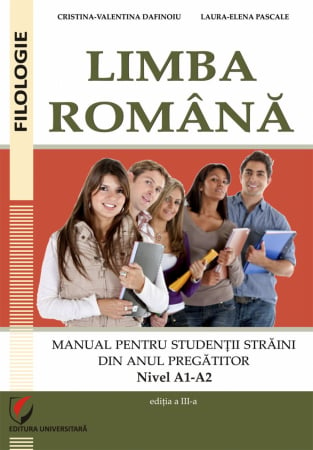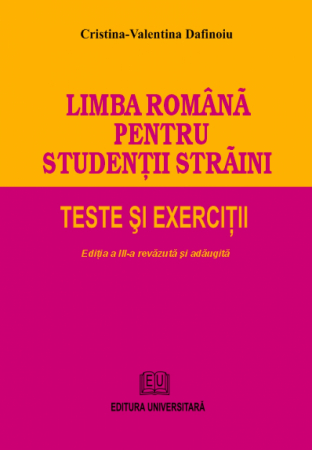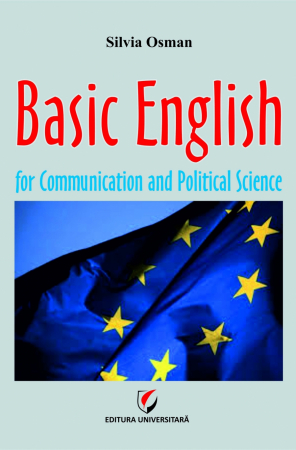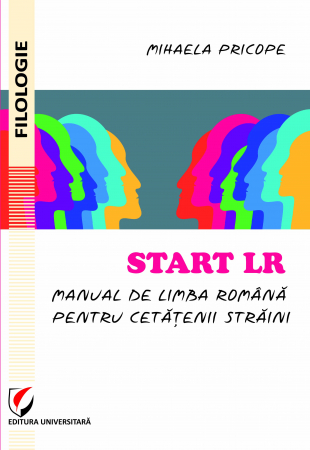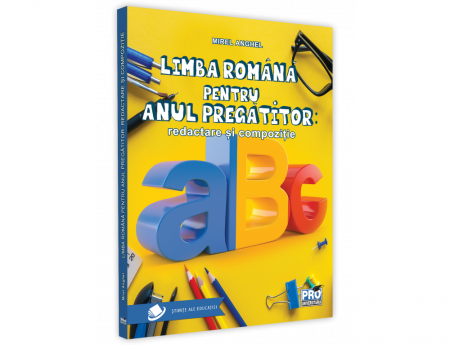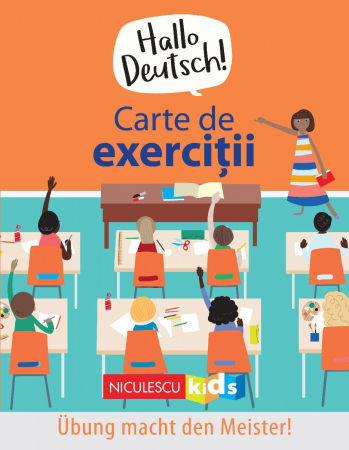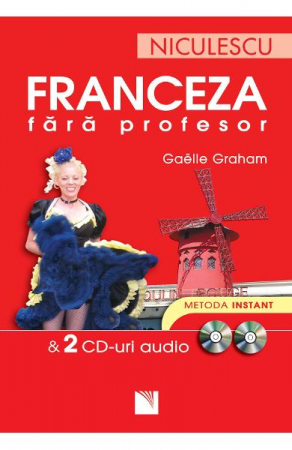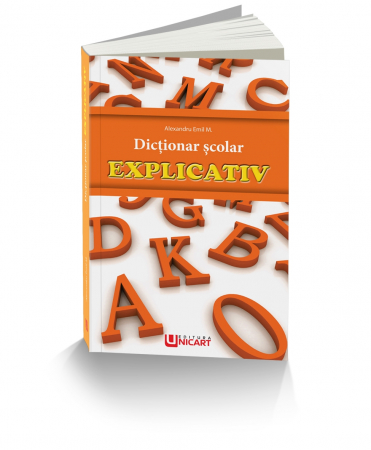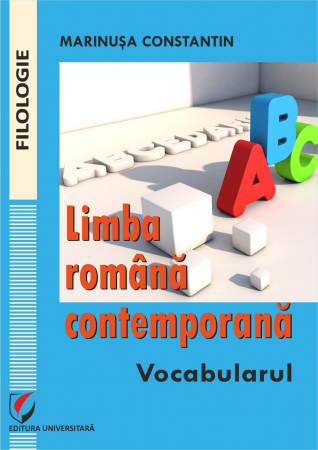Manuscript proposals: info@editurauniversitara.ro / 0745 204 115 //// Tracking orders Individuals / Sales:0745 200 718 / 0745 200 357 Orders Legal entities: 0721 722 783
Publisher: Pro Universitaria
Author: Valeriu Marinescu
Pages: 255
Publisher year: 2021
ISBN: 978-606-26-1347-1
Product Code:
9786062613471
Do you need help?
0745 200 718
/
0745 200 357
- Description
- Authors
- Content
- More details
- Where to find it
- Reviews (0)
The main element of originality of the paper is the coverage of the entire curricular area of language and communication in Romanian pre-university education (regarding both the discipline of Romanian language and literature, as well as modern languages); At the moment, there is no similar work on the book market in our country. If we consider the last chapter, entitled Challenges: teaching the Romanian language as a foreign language, we have, practically, a "whole", complete didactics of the Romanian language.
Another novelty in the field of the book is that it has as main recipient the "today's" teacher of the "today's" student, proposing a series of updates of the didactic approach. The very generous conceptual orientation is twinned with the richness of the researched facts, examined in detail.
A "strength" of the volume is the balance between theory and practice. The suggested applications prove to be well chosen and graded in terms of complexity and difficulty, showing teachers the importance of differentiated treatment of students.
Prof. univ. Dr. habil. Elena Tirziman
This book is naturally placed between the didactic works signed by Mr. Valeriu Marinescu and makes visible the author's preoccupations of theorizing the methodological and pedagogical activities specific to the pre-university and university environment. The paper is a real help for students who are preparing for teaching, for beginning teachers, but also for those with some experience in the department, by operationalizing knowledge and by respecting the principle of gradual acquisition. Permanently offers examples and explanations, comparisons and various applications are made, in order to better understand the material presented.
The author made the (successful) effort to put the information in accordance with the current legislation in the field and with the new guidelines (for example, with the Order of the Minister of Education no. or with the Order of the Minister of National Education No. 4694/2019 approving the new Curriculum for early education).
Conf. Univ. Dr. Adina Pescaru
Bibliography:
Bocos, Musata (2013), Design, organization and realization of the didactic activity. In Voiculescu, Florea (coord.) - Elaboration of the training program in the field of specialty teaching, Bucharest, Matrix Rom Publishing House.
Ciolan, Lucian (2013), Project-based learning. In Neacsu, Ioan (coord.) - Training methods in "specialty didactics", Bucharest, Matrix Rom Publishing House.
DEX - The explanatory dictionary of the Romanian language (2016), Romanian Academy. Institute of Linguistics „Iorgu Iordan - Al. Rosettes ”. 2nd edition, revised, Bucharest, Univers Enciclopedic Gold Publishing House.
Got, Miorita (2007), Stylistics of the Romanian language, Bucharest, "Romania de Maine" Foundation Publishing House.
Hattie, John (2014), Visible Learning. Guide for teachers. English translation by Cristina Dumitru. Bucharest, Trei Publishing House.
Hedesan, Otilia, coord. (2012), ABC for Romania! Romanian language manual for foreigners. Advanced, 3rd Edition, Timisoara, Intercultural Institute.
Hedesan, Otilia, coord. (2012), Welcome to Romania! Romanian language manual for foreigners. Beginners, 3rd Edition, Timisoara, Intercultural Institute.
Jansen, Julie (2007), Career Management (Romanian version), Iasi, Polirom Publishing House.
Lazarescu, Rodica, coord. (2008), Reading - didactic adventure?!, Targoviste, Transversal Publishing House.
National education law no. 1/2011, published in the Official Gazette of Romania, Part I, No. 18 / 10.I.2011.
Manolescu Aurel (1998), Human Resources Management, Bucharest, RAI Publishing House.
Marinescu, Valeriu (2014), Beginning Teachers „Facing” the Reader Formation Status in Primary School, on the CD of the International Conference Modernity and Competitiveness in Education, Bucharest.
Marinescu, Valeriu (2004), Didactics of the Romanian language and literature in the current context of the reform in education, Ars Docendi Publishing House, Bucharest.
Marinescu, Valeriu (2013), Guide to good practices. Didactics of Romanian language and literature, Bucharest, Matrix Rom Publishing House.
Marinescu, Valeriu (2014), L’approche pédagogique EDA, in the volume Colocviului stiintific international Constructions identitaires. Reverberations of the French Cultural Model in a European and Universal Context, Volume 3: Linguistics and Didactics, Editura Presa Universitara Balteana, Balti & Editura Vasiliana ’98, Iasi.
Marinescu, Valeriu (2015), Romanian language and literature in primary education - between knowledge and competencies, in Professor Florea Voiculescu at 65 (anniversary volume), Pedagogy Studies, Bucharest, Didactic and Pedagogical Publishing House.
Marinescu, Valeriu (2015), Literatura pentru bambini - aspecte ale interpretarii textuale, in La Francopolyphonie, number 10/2015, vol 1: L'interculturalité et l'herméneutique à travers la linguistique, la littérature, la traduction et la communication, Chisinau, International Free University of Moldova (ULIM).
Marinescu, Valeriu (2002), Methodology of teaching the Romanian language and literature, Bucharest, Publishing House of the “Romania de Maine” Foundation (republished in 2004).
Marinescu, Valeriu (2007), Teaching-learning the Romanian language and literature in middle school and high school, Bucharest, "Romania de Maine" Foundation Publishing House.
Marinescu, Valeriu (2013), Beginner teachers "face to face" the national evaluation of high school graduates in Romanian language and literature, in Research and practice in modern didactics: Proceedings of the Annual Didactics Conference (Coordinators: Laura Serbanescu, Florea Voiculescu), Bucharest , Editura Matrix Rom.
Marinescu, Valeriu (2016), The Teaching Practice Program - Between a Traditional Perspective and the Need for Creativity, in Annals of “Spiru Haret” University - Philology Series. Foreign languages and literatures, no. 21, Bucharest, Romania of Tomorrow Foundation Publishing House.
Marinescu, Valeriu (2017), TRANSformations in pedagogical practice for high school and higher education: from a formal activity to an efficient training, in Conference Proceedings: Border Crossings: Rethinking „TRANS-” in Literature, Language and Media, Milan, Italy, Revived Editions.
Molan, Vasile (2017), Didactics of the field "language and communication" in preschool education, Bucharest, Miniped Publishing House.
Molan, Vasile (2015), Didactics of the disciplines "Communication in Romanian language" and "Romanian language and literature" in primary education, Bucharest, Miniped Publishing House.
Neacsu, Ioan, coord. (2013), Training methods in "specialty didactics", Bucharest, Matrix Rom Publishing House.
Pana Dindelegan, Gabriela, coordinator (2019), Grammar of the Romanian language for high school, Bucharest, Univers Enciclopedic Gold Publishing House.
Paun, Emil, Liliana Ezechil, coord. (2013), Coaching methods and techniques used during pedagogical practice, Bucharest, Matrix Rom Publishing House.
Panisoara, Ion-Ovidiu (2003), Efficient communication. Methods of educational interaction, Iasi, Polirom Publishing House.
Panisoara, Ion-Ovidiu (2013), The method of observed interaction (fishbowl), in Neacsu, Ioan (coord.).
Rafaila, Elena (2013), Debate. in Neacsu, Ioan (coord.).
Sahlberg, Pasi (2019), Educational Leadership. The Finnish model. Four significant and inexpensive ideas for improving education. English translation by Veronica Tomescu, Bucharest, Trei Publishing House.
Samihaian, Florentina, Sofia Dobra, Monica Halaszi, Anca Davidoiu-Roman (2017), Romanian language and literature (textbook for 5th grade), Bucharest, Art.
Samihaian, Florentina, Sofia Dobra, Monica Halaszi, Anca Davidoiu-Roman (2019), Romanian language and literature (textbook for seventh grade), Bucharest, Art.
Secrieru, Mihaela (2006), Didactics of the Romanian language, Iasi, Sedcom Libris Publishing House.
Senge, Peter, coordinator (2016), Learning schools: the fifth discipline applied in education. English translation by Zinaida Mahu, Bucharest, Trei Publishing House.
Stefanescu, Alex. (2014), Message to young people: rediscover literature !, Bucharest, Curtea Veche Publishing House.
Toma, Ion (1999), Functional stylistics of the Romanian language, University of Bucharest Publishing House.
Vartopeanu, Victoria (coord.), Gabriela Catrina, Mihaela Marin, Daniel Tache, Rodica Lazarescu, Gabriela Musoiu, Alina Vrezgo (2009), The teachings of some teachers to their descendants or Strategies and didactic methods applied to the Romanian language and literature classes in the cycle superior of the high school, Targoviste, AMS Publishing House.
Vasilescu, Eugenia, Ion Popescu (1999), Methodology of teaching the Romanian language in grades I - IV, Bucharest, "Viata romaneasca" Publishing House and Press.
Vlasceanu, Mihaela (2002), Career Management, Bucharest, Comunicare.ro Publishing House.
Voiculescu, Florea, coord. (2013), Elaboration of the training program in the field of specialty didactics, Bucharest, Matrix Rom Publishing House.
Another novelty in the field of the book is that it has as main recipient the "today's" teacher of the "today's" student, proposing a series of updates of the didactic approach. The very generous conceptual orientation is twinned with the richness of the researched facts, examined in detail.
A "strength" of the volume is the balance between theory and practice. The suggested applications prove to be well chosen and graded in terms of complexity and difficulty, showing teachers the importance of differentiated treatment of students.
Prof. univ. Dr. habil. Elena Tirziman
This book is naturally placed between the didactic works signed by Mr. Valeriu Marinescu and makes visible the author's preoccupations of theorizing the methodological and pedagogical activities specific to the pre-university and university environment. The paper is a real help for students who are preparing for teaching, for beginning teachers, but also for those with some experience in the department, by operationalizing knowledge and by respecting the principle of gradual acquisition. Permanently offers examples and explanations, comparisons and various applications are made, in order to better understand the material presented.
The author made the (successful) effort to put the information in accordance with the current legislation in the field and with the new guidelines (for example, with the Order of the Minister of Education no. or with the Order of the Minister of National Education No. 4694/2019 approving the new Curriculum for early education).
Conf. Univ. Dr. Adina Pescaru
Bibliography:
Bocos, Musata (2013), Design, organization and realization of the didactic activity. In Voiculescu, Florea (coord.) - Elaboration of the training program in the field of specialty teaching, Bucharest, Matrix Rom Publishing House.
Ciolan, Lucian (2013), Project-based learning. In Neacsu, Ioan (coord.) - Training methods in "specialty didactics", Bucharest, Matrix Rom Publishing House.
DEX - The explanatory dictionary of the Romanian language (2016), Romanian Academy. Institute of Linguistics „Iorgu Iordan - Al. Rosettes ”. 2nd edition, revised, Bucharest, Univers Enciclopedic Gold Publishing House.
Got, Miorita (2007), Stylistics of the Romanian language, Bucharest, "Romania de Maine" Foundation Publishing House.
Hattie, John (2014), Visible Learning. Guide for teachers. English translation by Cristina Dumitru. Bucharest, Trei Publishing House.
Hedesan, Otilia, coord. (2012), ABC for Romania! Romanian language manual for foreigners. Advanced, 3rd Edition, Timisoara, Intercultural Institute.
Hedesan, Otilia, coord. (2012), Welcome to Romania! Romanian language manual for foreigners. Beginners, 3rd Edition, Timisoara, Intercultural Institute.
Jansen, Julie (2007), Career Management (Romanian version), Iasi, Polirom Publishing House.
Lazarescu, Rodica, coord. (2008), Reading - didactic adventure?!, Targoviste, Transversal Publishing House.
National education law no. 1/2011, published in the Official Gazette of Romania, Part I, No. 18 / 10.I.2011.
Manolescu Aurel (1998), Human Resources Management, Bucharest, RAI Publishing House.
Marinescu, Valeriu (2014), Beginning Teachers „Facing” the Reader Formation Status in Primary School, on the CD of the International Conference Modernity and Competitiveness in Education, Bucharest.
Marinescu, Valeriu (2004), Didactics of the Romanian language and literature in the current context of the reform in education, Ars Docendi Publishing House, Bucharest.
Marinescu, Valeriu (2013), Guide to good practices. Didactics of Romanian language and literature, Bucharest, Matrix Rom Publishing House.
Marinescu, Valeriu (2014), L’approche pédagogique EDA, in the volume Colocviului stiintific international Constructions identitaires. Reverberations of the French Cultural Model in a European and Universal Context, Volume 3: Linguistics and Didactics, Editura Presa Universitara Balteana, Balti & Editura Vasiliana ’98, Iasi.
Marinescu, Valeriu (2015), Romanian language and literature in primary education - between knowledge and competencies, in Professor Florea Voiculescu at 65 (anniversary volume), Pedagogy Studies, Bucharest, Didactic and Pedagogical Publishing House.
Marinescu, Valeriu (2015), Literatura pentru bambini - aspecte ale interpretarii textuale, in La Francopolyphonie, number 10/2015, vol 1: L'interculturalité et l'herméneutique à travers la linguistique, la littérature, la traduction et la communication, Chisinau, International Free University of Moldova (ULIM).
Marinescu, Valeriu (2002), Methodology of teaching the Romanian language and literature, Bucharest, Publishing House of the “Romania de Maine” Foundation (republished in 2004).
Marinescu, Valeriu (2007), Teaching-learning the Romanian language and literature in middle school and high school, Bucharest, "Romania de Maine" Foundation Publishing House.
Marinescu, Valeriu (2013), Beginner teachers "face to face" the national evaluation of high school graduates in Romanian language and literature, in Research and practice in modern didactics: Proceedings of the Annual Didactics Conference (Coordinators: Laura Serbanescu, Florea Voiculescu), Bucharest , Editura Matrix Rom.
Marinescu, Valeriu (2016), The Teaching Practice Program - Between a Traditional Perspective and the Need for Creativity, in Annals of “Spiru Haret” University - Philology Series. Foreign languages and literatures, no. 21, Bucharest, Romania of Tomorrow Foundation Publishing House.
Marinescu, Valeriu (2017), TRANSformations in pedagogical practice for high school and higher education: from a formal activity to an efficient training, in Conference Proceedings: Border Crossings: Rethinking „TRANS-” in Literature, Language and Media, Milan, Italy, Revived Editions.
Molan, Vasile (2017), Didactics of the field "language and communication" in preschool education, Bucharest, Miniped Publishing House.
Molan, Vasile (2015), Didactics of the disciplines "Communication in Romanian language" and "Romanian language and literature" in primary education, Bucharest, Miniped Publishing House.
Neacsu, Ioan, coord. (2013), Training methods in "specialty didactics", Bucharest, Matrix Rom Publishing House.
Pana Dindelegan, Gabriela, coordinator (2019), Grammar of the Romanian language for high school, Bucharest, Univers Enciclopedic Gold Publishing House.
Paun, Emil, Liliana Ezechil, coord. (2013), Coaching methods and techniques used during pedagogical practice, Bucharest, Matrix Rom Publishing House.
Panisoara, Ion-Ovidiu (2003), Efficient communication. Methods of educational interaction, Iasi, Polirom Publishing House.
Panisoara, Ion-Ovidiu (2013), The method of observed interaction (fishbowl), in Neacsu, Ioan (coord.).
Rafaila, Elena (2013), Debate. in Neacsu, Ioan (coord.).
Sahlberg, Pasi (2019), Educational Leadership. The Finnish model. Four significant and inexpensive ideas for improving education. English translation by Veronica Tomescu, Bucharest, Trei Publishing House.
Samihaian, Florentina, Sofia Dobra, Monica Halaszi, Anca Davidoiu-Roman (2017), Romanian language and literature (textbook for 5th grade), Bucharest, Art.
Samihaian, Florentina, Sofia Dobra, Monica Halaszi, Anca Davidoiu-Roman (2019), Romanian language and literature (textbook for seventh grade), Bucharest, Art.
Secrieru, Mihaela (2006), Didactics of the Romanian language, Iasi, Sedcom Libris Publishing House.
Senge, Peter, coordinator (2016), Learning schools: the fifth discipline applied in education. English translation by Zinaida Mahu, Bucharest, Trei Publishing House.
Stefanescu, Alex. (2014), Message to young people: rediscover literature !, Bucharest, Curtea Veche Publishing House.
Toma, Ion (1999), Functional stylistics of the Romanian language, University of Bucharest Publishing House.
Vartopeanu, Victoria (coord.), Gabriela Catrina, Mihaela Marin, Daniel Tache, Rodica Lazarescu, Gabriela Musoiu, Alina Vrezgo (2009), The teachings of some teachers to their descendants or Strategies and didactic methods applied to the Romanian language and literature classes in the cycle superior of the high school, Targoviste, AMS Publishing House.
Vasilescu, Eugenia, Ion Popescu (1999), Methodology of teaching the Romanian language in grades I - IV, Bucharest, "Viata romaneasca" Publishing House and Press.
Vlasceanu, Mihaela (2002), Career Management, Bucharest, Comunicare.ro Publishing House.
Voiculescu, Florea, coord. (2013), Elaboration of the training program in the field of specialty didactics, Bucharest, Matrix Rom Publishing House.
- teacher at the University of Agronomic Sciences and Veterinary Medicine in Bucharest and at the University of Bucharest
- expert national evaluator ARACIS (Romanian Agency for Quality Assurance in Higher Education) in the Commission of Humanities and Theology, Language and Literature
- external specialist for the scientific approval (evaluation of the scientific and didactic quality of the textbook projects) within the Ministry of National Education - National Center for Evaluation and Examination and within some publishing houses in Romania
- scientific referent in doctoral commissions and member in commissions for granting university didactic titles
- producer of cultural programs on "Romania de Maine" Television (TVRM), later called TVH
- expert evaluator within the Ministry of Education and Research (National Center for Scholarships Abroad)
- collaborator of the Center for European Socio-Human Projects within the Institute of History and Literary Theory „G. Calinescu ”- Romanian Academy
- member of the "Working Group for the elaboration of Romanian language and literature programs, final exams and didactic degrees", group affiliated to the National Commission of Romanian Language and Literature within the Ministry of Education, Research and Youth
- member in seven research projects, obtained through competition
- participant in a training internship in Paris, France (through the Romanian Academy); exchanges of experience with researchers and teachers from several European countries: France, Belgium, Italy, Czech Republic, Poland, Bulgaria
- fields of interest and expertise: didactics and education sciences, quality management in higher education, Romanian literary language, European projects, Romanian literature, Romanian culture and civilization in a European context
- elaborated scientific papers: 16 unique author books, published by CNCS or CNCSIS accredited publishing houses, and over 50 articles, studies and communications published in journals indexed in international databases, in journals classified by CNCS as A or B, in volumes of international conferences or congresses, in the Scientific Annals of universities and the Romanian Academy, in collective and homage volumes and in other specialized journals
- numerous communications held at university days, at colloquia, symposia, conferences, round tables, scientific workshops, organized in an institutional framework by universities and by the Romanian Academy
- presence in databases and in libraries in the country and abroad: CEEOL (5 present), Bucharest Central University Library (4 present), Cluj-Napoca Central University Library (12 present), Iasi Central University Library (14 present), Timisoara Central University Library (8 present), Romanian Academy Library (11 present)
- forerunner of specialized works
- expert national evaluator ARACIS (Romanian Agency for Quality Assurance in Higher Education) in the Commission of Humanities and Theology, Language and Literature
- external specialist for the scientific approval (evaluation of the scientific and didactic quality of the textbook projects) within the Ministry of National Education - National Center for Evaluation and Examination and within some publishing houses in Romania
- scientific referent in doctoral commissions and member in commissions for granting university didactic titles
- producer of cultural programs on "Romania de Maine" Television (TVRM), later called TVH
- expert evaluator within the Ministry of Education and Research (National Center for Scholarships Abroad)
- collaborator of the Center for European Socio-Human Projects within the Institute of History and Literary Theory „G. Calinescu ”- Romanian Academy
- member of the "Working Group for the elaboration of Romanian language and literature programs, final exams and didactic degrees", group affiliated to the National Commission of Romanian Language and Literature within the Ministry of Education, Research and Youth
- member in seven research projects, obtained through competition
- participant in a training internship in Paris, France (through the Romanian Academy); exchanges of experience with researchers and teachers from several European countries: France, Belgium, Italy, Czech Republic, Poland, Bulgaria
- fields of interest and expertise: didactics and education sciences, quality management in higher education, Romanian literary language, European projects, Romanian literature, Romanian culture and civilization in a European context
- elaborated scientific papers: 16 unique author books, published by CNCS or CNCSIS accredited publishing houses, and over 50 articles, studies and communications published in journals indexed in international databases, in journals classified by CNCS as A or B, in volumes of international conferences or congresses, in the Scientific Annals of universities and the Romanian Academy, in collective and homage volumes and in other specialized journals
- numerous communications held at university days, at colloquia, symposia, conferences, round tables, scientific workshops, organized in an institutional framework by universities and by the Romanian Academy
- presence in databases and in libraries in the country and abroad: CEEOL (5 present), Bucharest Central University Library (4 present), Cluj-Napoca Central University Library (12 present), Iasi Central University Library (14 present), Timisoara Central University Library (8 present), Romanian Academy Library (11 present)
- forerunner of specialized works
Content
Argument / 9
Training students for teaching in the field of philology / 13
The concept of didactics / 27
Focusing on the student and training skills in the field of philology / 33
The curriculum from the perspective of the National Education Law no. 1/2011 / 47
Educational objectives / 50
Didactic transposition / 54
Teaching principles / 61
Choosing the textbook / 77
Didactic activity design / 83
Teaching strategies, teaching methods and work techniques / 97
Changes in the grammar of the Romanian language taught in high school / 143
Didactic aspects of literary text interpretation / 157
Recommendations for the evaluation of knowledge in the educational disciplines in the curricular area language and communication / 207
Challenges: Teaching Romanian as a foreign language / 227
Bibliography / 253
Argument / 9
Training students for teaching in the field of philology / 13
The concept of didactics / 27
Focusing on the student and training skills in the field of philology / 33
The curriculum from the perspective of the National Education Law no. 1/2011 / 47
Educational objectives / 50
Didactic transposition / 54
Teaching principles / 61
Choosing the textbook / 77
Didactic activity design / 83
Teaching strategies, teaching methods and work techniques / 97
Changes in the grammar of the Romanian language taught in high school / 143
Didactic aspects of literary text interpretation / 157
Recommendations for the evaluation of knowledge in the educational disciplines in the curricular area language and communication / 207
Challenges: Teaching Romanian as a foreign language / 227
Bibliography / 253
ARGUMENT
Designed, in general, as an applied methodology, this paper is a flexible material, designed in a pragmatic spirit, easily adaptable to a wide variety of circumstances, material intended primarily for students in Romanian language and literature (LLR), foreign languages and literatures (LLS), pedagogy of preschool and primary education (PIPP), which are preparing for teaching. The usefulness of the paper can be appreciated if we take into account the fact that the Order of the Minister of Education and Research no. 4524 of June 12, 2020, published in the Official Gazette of Romania, Part I, No. 528 / 19.VI.2020, allows the establishment and organization of university didactic master programs. As a document subsequent to this Ministerial Order, the Council of the Romanian Agency for Quality Assurance in Higher Education (ARACIS) approved, on July 13, 2020, the Specific Standards on external evaluation of the academic quality of master's degree programs in the field: Education Sciences - master didactic.
On the other hand, as it presents a series of positive teaching experiences, this book - without being either prescriptive or restrictive - comes in support of teachers (especially beginners), with the natural specification that an experience of a teacher can not be fully applied in the situation of another teacher. We only consider the suggestion of efficient ways to approach the didactic problems, from which one can start in the development of one's own strategies or in finding new approaches in teaching. And this, because “good teachers are themselves involved in a continuous learning, both of the subject they teach and of the teaching profession, developing throughout their lives” (Senge 2016: 28), assuming the role of learning professionals.
The book is based on the three didactic works developed by me over time (and published in 2002, 2007 and 2013), but compared to these (which were addressed only to Romanian teachers in middle school and high school) , has three novelty elements: (1) it also covers the main aspects related to the formation and development of communication competence, pursued in kindergarten and primary education; (2) language and communication are opened to the entire curricular area, aiming, therefore, at the teaching-learning of foreign languages; (3) tries to come to the aid of teachers with less experience in higher education (assistants and university lecturers), starting from an older intention (unfortunately, abandoned) of the Ministry of Education - to achieve a "body ”Of teachers for higher education, to train experts who, in turn, will ensure the continuous training of teachers in universities1. Of course, this book takes into account the changes determined by the new approaches of didactics (with increased emphasis on motivating the student for learning), personal research, but also a series of elements arising from the practice at the department.
Theoretical issues are presented in a logical and accessible manner, sometimes in the form of sheets, diagrams or synthetic tables, in a "airy" material, clear, useful. The suggestions offered, involving numerous and varied learning activities, but eliminating excessively theorizing approaches from some specialized works, can be taken over by teachers as such or amended, allowing teachers to show their creativity. The Romanian teacher, the modern language teacher, but also the one for preschool and primary education will find, in this book, ideas for adapting the didactic approach, so that the trainee is more strongly placed in the center of attention. We must not forget that "we face an extremely difficult but vital and crucial task: the re-creation of schools, to serve the students who will become adults in a post-industrial and increasingly interconnected world" (ibid .: 19 ).
Today's student wants to be taught only what will be really useful in life, only what is relevant to them, in a world in full computerization and globalization. On the other hand, the graduate of high school in Romania, referring to the "huge" averages of high school admission in recent years (and especially since 2020), feels an extraordinary pressure not to be competitive and not to be successful in life. The direct consequence: many high school graduates know how to seriously prepare for the "official" exams, but few of them manage to use their creativity. "Students who spend most of their time in class learning to pass tests lose opportunities to gain other skills that would be valuable to them as complete, competent human beings" (ibid.: 25), thus "failing" the exam. "Unofficial" - that of life. Therefore, this book proposes didactic activities appropriate to the age peculiarities of students, who increase the efficiency of learning through discovery, help to confront their opinions, on which occasion the expressed points of view are enriched. The importance of balancing the weight given to oral and written expression is emphasized.
Regarding literary works, the book favors heuristic strategies, very suitable for deciphering and interpreting the meanings of a text, in primary, secondary or high school. Teachers will find suggestions to help students to correlate explicit and implicit information in the supporting text, to "bombard" the text with hypotheses, to get it out of latent polysemy. Working in teams, having a competent dialogue with each other and with their teacher, students will be able to express themselves appropriately, to present their point of view and, at the same time, knowledge about the approached text (including if it is about the characterization of the literary character, about explaining the title of a text, etc.). We advocate for reflective thinking and constructive conversation, the student thus becoming aware of his attitudes and perceptions, but also of those around him.
If we refer to the teaching of language notions, this book aims, above all, as required by the curricula in force, to understand the linguistic phenomenon, in general, with its defining aspects: the system character of the language, language functions, levels of use of language. Grammatical knowledge is treated as elements that contribute to the structuring of a correct and efficient communication. The work tasks proposed to the students in pedagogical practice and to the beginner teachers, concretized in clear requirements, facilitate the deepening of the approached subjects. Everyone is free to try the techniques and exercises that they find useful. It is important for a teacher that all his methodical and specialized knowledge, no matter where he acquires it, be reflected in his performance.
The last chapter of this book, entitled Challenges: teaching Romanian as a foreign language, comes in support of teachers in pre-university and higher education in Romania who can either become Romanian language teachers in schools and universities in Europe, but also in other countries. countries of the world, through the Institute of Romanian Language, can either be co-opted in the Romanian Language Preparatory Program for foreign citizens working in many universities in our country, or can have the opportunity to teach Romanian as a foreign language in various other contexts, formal or informal .
Designed, in general, as an applied methodology, this paper is a flexible material, designed in a pragmatic spirit, easily adaptable to a wide variety of circumstances, material intended primarily for students in Romanian language and literature (LLR), foreign languages and literatures (LLS), pedagogy of preschool and primary education (PIPP), which are preparing for teaching. The usefulness of the paper can be appreciated if we take into account the fact that the Order of the Minister of Education and Research no. 4524 of June 12, 2020, published in the Official Gazette of Romania, Part I, No. 528 / 19.VI.2020, allows the establishment and organization of university didactic master programs. As a document subsequent to this Ministerial Order, the Council of the Romanian Agency for Quality Assurance in Higher Education (ARACIS) approved, on July 13, 2020, the Specific Standards on external evaluation of the academic quality of master's degree programs in the field: Education Sciences - master didactic.
On the other hand, as it presents a series of positive teaching experiences, this book - without being either prescriptive or restrictive - comes in support of teachers (especially beginners), with the natural specification that an experience of a teacher can not be fully applied in the situation of another teacher. We only consider the suggestion of efficient ways to approach the didactic problems, from which one can start in the development of one's own strategies or in finding new approaches in teaching. And this, because “good teachers are themselves involved in a continuous learning, both of the subject they teach and of the teaching profession, developing throughout their lives” (Senge 2016: 28), assuming the role of learning professionals.
The book is based on the three didactic works developed by me over time (and published in 2002, 2007 and 2013), but compared to these (which were addressed only to Romanian teachers in middle school and high school) , has three novelty elements: (1) it also covers the main aspects related to the formation and development of communication competence, pursued in kindergarten and primary education; (2) language and communication are opened to the entire curricular area, aiming, therefore, at the teaching-learning of foreign languages; (3) tries to come to the aid of teachers with less experience in higher education (assistants and university lecturers), starting from an older intention (unfortunately, abandoned) of the Ministry of Education - to achieve a "body ”Of teachers for higher education, to train experts who, in turn, will ensure the continuous training of teachers in universities1. Of course, this book takes into account the changes determined by the new approaches of didactics (with increased emphasis on motivating the student for learning), personal research, but also a series of elements arising from the practice at the department.
Theoretical issues are presented in a logical and accessible manner, sometimes in the form of sheets, diagrams or synthetic tables, in a "airy" material, clear, useful. The suggestions offered, involving numerous and varied learning activities, but eliminating excessively theorizing approaches from some specialized works, can be taken over by teachers as such or amended, allowing teachers to show their creativity. The Romanian teacher, the modern language teacher, but also the one for preschool and primary education will find, in this book, ideas for adapting the didactic approach, so that the trainee is more strongly placed in the center of attention. We must not forget that "we face an extremely difficult but vital and crucial task: the re-creation of schools, to serve the students who will become adults in a post-industrial and increasingly interconnected world" (ibid .: 19 ).
Today's student wants to be taught only what will be really useful in life, only what is relevant to them, in a world in full computerization and globalization. On the other hand, the graduate of high school in Romania, referring to the "huge" averages of high school admission in recent years (and especially since 2020), feels an extraordinary pressure not to be competitive and not to be successful in life. The direct consequence: many high school graduates know how to seriously prepare for the "official" exams, but few of them manage to use their creativity. "Students who spend most of their time in class learning to pass tests lose opportunities to gain other skills that would be valuable to them as complete, competent human beings" (ibid.: 25), thus "failing" the exam. "Unofficial" - that of life. Therefore, this book proposes didactic activities appropriate to the age peculiarities of students, who increase the efficiency of learning through discovery, help to confront their opinions, on which occasion the expressed points of view are enriched. The importance of balancing the weight given to oral and written expression is emphasized.
Regarding literary works, the book favors heuristic strategies, very suitable for deciphering and interpreting the meanings of a text, in primary, secondary or high school. Teachers will find suggestions to help students to correlate explicit and implicit information in the supporting text, to "bombard" the text with hypotheses, to get it out of latent polysemy. Working in teams, having a competent dialogue with each other and with their teacher, students will be able to express themselves appropriately, to present their point of view and, at the same time, knowledge about the approached text (including if it is about the characterization of the literary character, about explaining the title of a text, etc.). We advocate for reflective thinking and constructive conversation, the student thus becoming aware of his attitudes and perceptions, but also of those around him.
If we refer to the teaching of language notions, this book aims, above all, as required by the curricula in force, to understand the linguistic phenomenon, in general, with its defining aspects: the system character of the language, language functions, levels of use of language. Grammatical knowledge is treated as elements that contribute to the structuring of a correct and efficient communication. The work tasks proposed to the students in pedagogical practice and to the beginner teachers, concretized in clear requirements, facilitate the deepening of the approached subjects. Everyone is free to try the techniques and exercises that they find useful. It is important for a teacher that all his methodical and specialized knowledge, no matter where he acquires it, be reflected in his performance.
The last chapter of this book, entitled Challenges: teaching Romanian as a foreign language, comes in support of teachers in pre-university and higher education in Romania who can either become Romanian language teachers in schools and universities in Europe, but also in other countries. countries of the world, through the Institute of Romanian Language, can either be co-opted in the Romanian Language Preparatory Program for foreign citizens working in many universities in our country, or can have the opportunity to teach Romanian as a foreign language in various other contexts, formal or informal .
February 2021
Valeriu MARINESCU
Valeriu MARINESCU
www.editurauniversitara.ro
If you want to express your opinion about this product you can add a review.
write a review
Customer Support Monday - Friday, between 8.00 - 16.00
0745 200 718 0745 200 357 comenzi@editurauniversitara.ro
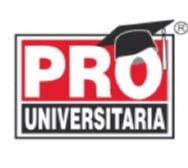
![Elements of didactics of philological disciplines. New perspectives - Valeriu Marinescu [1] Elements of didactics of philological disciplines. New perspectives - Valeriu Marinescu [1]](https://gomagcdn.ro/domains/editurauniversitara.ro/files/product/large/elements-of-didactics-of-philological-disciplines-new-perspectives-valeriu-marinescu-3109-4394.png)
